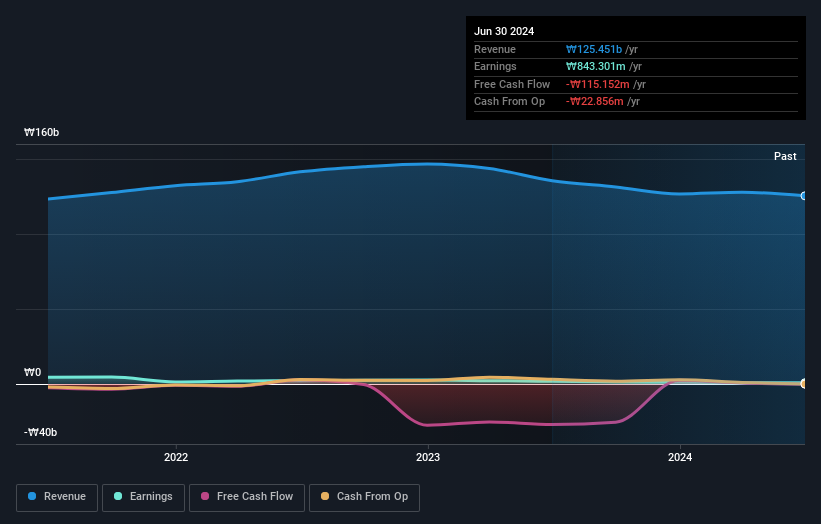- South Korea
- /
- Oil and Gas
- /
- KOSDAQ:A024060
Hung -Gu Oil Ltd (KOSDAQ:024060) CEO Sang-Woo Kim, the company's largest shareholder sees 12% reduction in holdings value

Key Insights
- Significant insider control over Hung -Gu Oil implies vested interests in company growth
- The top 2 shareholders own 55% of the company
- Ownership research, combined with past performance data can help provide a good understanding of opportunities in a stock
A look at the shareholders of Hung -Gu Oil Ltd (KOSDAQ:024060) can tell us which group is most powerful. And the group that holds the biggest piece of the pie are individual insiders with 55% ownership. That is, the group stands to benefit the most if the stock rises (or lose the most if there is a downturn).
And following last week's 12% decline in share price, insiders suffered the most losses.
In the chart below, we zoom in on the different ownership groups of Hung -Gu Oil.
Check out our latest analysis for Hung -Gu Oil

What Does The Institutional Ownership Tell Us About Hung -Gu Oil?
Institutions typically measure themselves against a benchmark when reporting to their own investors, so they often become more enthusiastic about a stock once it's included in a major index. We would expect most companies to have some institutions on the register, especially if they are growing.
As you can see, institutional investors have a fair amount of stake in Hung -Gu Oil. This suggests some credibility amongst professional investors. But we can't rely on that fact alone since institutions make bad investments sometimes, just like everyone does. If multiple institutions change their view on a stock at the same time, you could see the share price drop fast. It's therefore worth looking at Hung -Gu Oil's earnings history below. Of course, the future is what really matters.

Hedge funds don't have many shares in Hung -Gu Oil. With a 33% stake, CEO Sang-Woo Kim is the largest shareholder. For context, the second largest shareholder holds about 22% of the shares outstanding, followed by an ownership of 5.2% by the third-largest shareholder.
A more detailed study of the shareholder registry showed us that 2 of the top shareholders have a considerable amount of ownership in the company, via their 55% stake.
While it makes sense to study institutional ownership data for a company, it also makes sense to study analyst sentiments to know which way the wind is blowing. Our information suggests that there isn't any analyst coverage of the stock, so it is probably little known.
Insider Ownership Of Hung -Gu Oil
The definition of an insider can differ slightly between different countries, but members of the board of directors always count. Management ultimately answers to the board. However, it is not uncommon for managers to be executive board members, especially if they are a founder or the CEO.
I generally consider insider ownership to be a good thing. However, on some occasions it makes it more difficult for other shareholders to hold the board accountable for decisions.
Our most recent data indicates that insiders own the majority of Hung -Gu Oil Ltd. This means they can collectively make decisions for the company. That means they own ₩129b worth of shares in the ₩234b company. That's quite meaningful. Most would be pleased to see the board is investing alongside them. You may wish todiscover (for free) if they have been buying or selling.
General Public Ownership
The general public-- including retail investors -- own 40% stake in the company, and hence can't easily be ignored. While this group can't necessarily call the shots, it can certainly have a real influence on how the company is run.
Next Steps:
It's always worth thinking about the different groups who own shares in a company. But to understand Hung -Gu Oil better, we need to consider many other factors. Take risks for example - Hung -Gu Oil has 3 warning signs (and 2 which are potentially serious) we think you should know about.
Of course this may not be the best stock to buy. So take a peek at this free free list of interesting companies.
NB: Figures in this article are calculated using data from the last twelve months, which refer to the 12-month period ending on the last date of the month the financial statement is dated. This may not be consistent with full year annual report figures.
Valuation is complex, but we're here to simplify it.
Discover if Hung -Gu Oil might be undervalued or overvalued with our detailed analysis, featuring fair value estimates, potential risks, dividends, insider trades, and its financial condition.
Access Free AnalysisHave feedback on this article? Concerned about the content? Get in touch with us directly. Alternatively, email editorial-team (at) simplywallst.com.
This article by Simply Wall St is general in nature. We provide commentary based on historical data and analyst forecasts only using an unbiased methodology and our articles are not intended to be financial advice. It does not constitute a recommendation to buy or sell any stock, and does not take account of your objectives, or your financial situation. We aim to bring you long-term focused analysis driven by fundamental data. Note that our analysis may not factor in the latest price-sensitive company announcements or qualitative material. Simply Wall St has no position in any stocks mentioned.
About KOSDAQ:A024060
Hung -Gu Oil
Hung -Gu Oil Ltd wholesales and retails petroleum products in South Korea.
Low with imperfect balance sheet.

